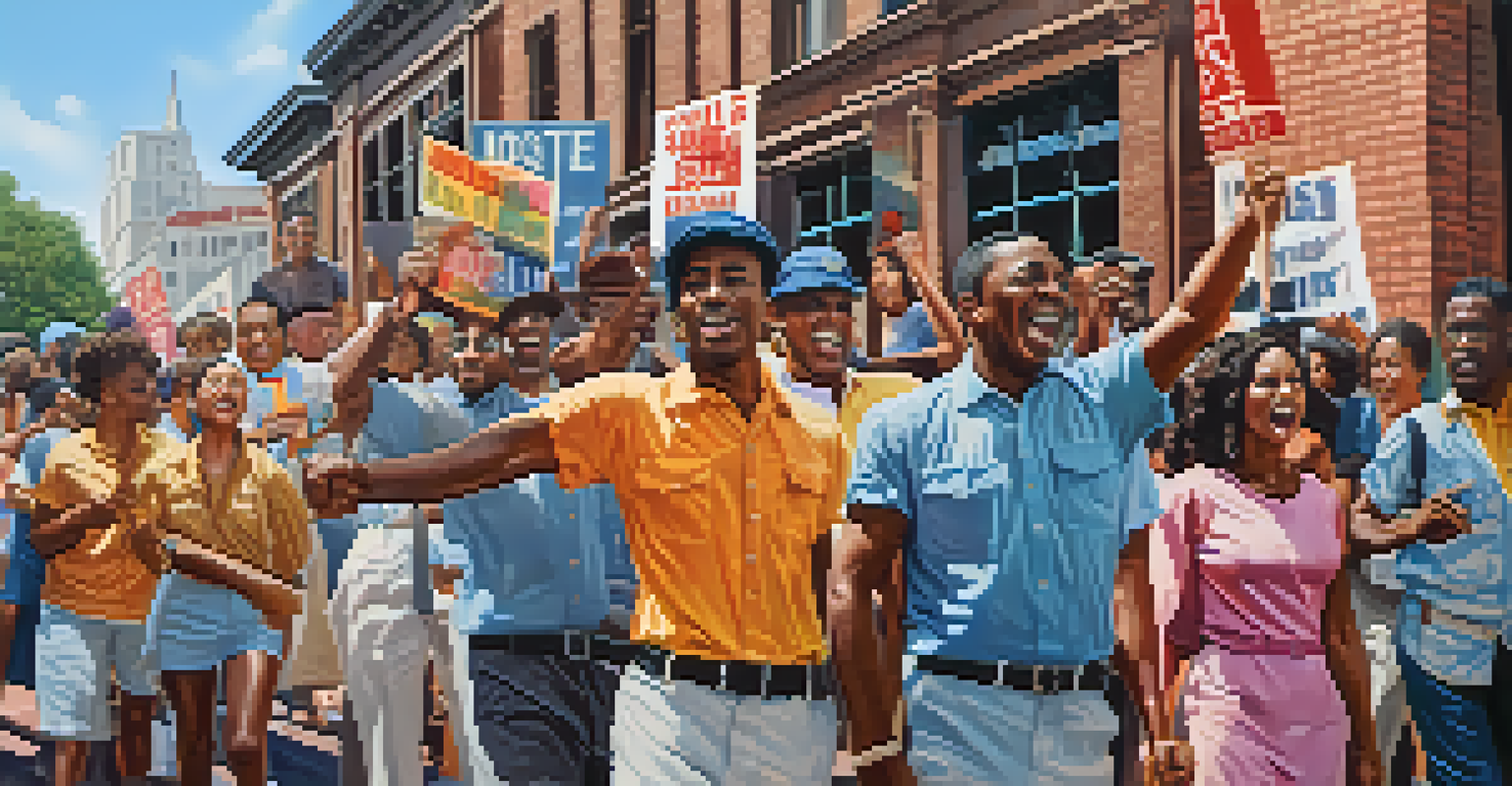The Evolution of Political Ideology in Georgia Over Time

Understanding Georgia's Early Political Landscape
Georgia's political landscape has deep historical roots, beginning with its colonial period. The state's founding in the 18th century was marked by a mix of British influence and local governance. Early settlers brought with them a range of political beliefs, often clashing over issues like representation and local autonomy.
The ballot is stronger than the bullet.
As Georgia transitioned into statehood, the debates around slavery and states' rights began to shape its political ideology. These issues became increasingly important leading up to the Civil War, creating a divide that would echo through generations. The state's reliance on agriculture and slave labor fostered a strong pro-slavery sentiment among many Georgians.
Following the Civil War and Reconstruction, Georgia's political identity continued to evolve. The rise of populism and the struggle for civil rights further complicated the political landscape. The shift from agrarian interests to industrialization marked a significant change, influencing the ideologies of the state's political figures.
The Impact of the Civil War and Reconstruction
The Civil War had a profound impact on Georgia's political ideologies, leading to significant changes during the Reconstruction era. Many Georgians found themselves grappling with the consequences of defeat and the complexities of rebuilding their society. This period was characterized by a push for civil rights, often met with fierce resistance.

During Reconstruction, the federal government implemented policies aimed at integrating formerly enslaved people into society. These policies created tension among white Georgians who felt their political power was being threatened. The struggle for control over local governance became a central theme as former Confederates sought to regain influence.
Georgia's Political Evolution
Georgia's political landscape has evolved significantly from its colonial roots through the Civil War, Reconstruction, and into contemporary issues shaped by demographics and social movements.
Ultimately, the end of Reconstruction in the 1870s saw the establishment of Jim Crow laws, which reinforced racial segregation and disenfranchised African Americans. This marked a regression in political progress for many Georgians, solidifying a conservative ideology that would dominate the state's politics for decades.
The Rise of the Democratic Party in Georgia
The late 19th and early 20th centuries saw the Democratic Party solidifying its hold on Georgia politics. This period was marked by the rise of influential leaders who championed white supremacy and segregationist policies. The Democratic Party's dominance was a direct response to the political turmoil of Reconstruction.
Injustice anywhere is a threat to justice everywhere.
As industrialization progressed, the party adapted its platform to address the needs of a changing economy. Although initially rooted in agrarian interests, the party began to include urban issues in its discussions, reflecting the growing importance of cities like Atlanta. This shift allowed the Democratic Party to maintain its appeal among a broader demographic.
However, the party's commitment to segregation and the disenfranchisement of Black voters led to increasing tensions. The civil rights movement of the 1950s and 1960s challenged the status quo, pushing for a reevaluation of the Democratic Party's values and ideologies in Georgia.
The Civil Rights Movement and Its Influence
The Civil Rights Movement of the 1960s was a pivotal moment for Georgia's political landscape. Activists, led by figures like Martin Luther King Jr., fought for equality and justice, challenging the entrenched political ideologies of the time. Georgia became a battleground for civil rights, with protests and demonstrations highlighting the need for change.
The movement's success in raising awareness about racial injustices forced many politicians to reconsider their positions. The passage of landmark legislation, such as the Civil Rights Act of 1964, began to dismantle discriminatory practices. This created a shift in political allegiances, with some white voters leaving the Democratic Party in response to its embrace of civil rights.
Civil Rights Movement Impact
The Civil Rights Movement of the 1960s was pivotal in reshaping Georgia's political ideologies, challenging entrenched beliefs and leading to a diversification of political representation.
As a result, the political landscape in Georgia began to diversify, with the emergence of more progressive ideologies. New leaders from various backgrounds sought to represent the interests of a broader constituency, marking a significant departure from the past.
The Republican Resurgence in Georgia Politics
The late 20th century witnessed a significant shift in Georgia's political ideology with the resurgence of the Republican Party. As many white voters grew disillusioned with the Democratic Party's progressive agenda, they began to gravitate toward Republican candidates. This transition was particularly evident in the 2000 gubernatorial election, which saw a Republican victory.
The Republican Party capitalized on emerging issues such as tax reform, economic development, and conservative social values. This strategy resonated with a significant portion of the electorate, leading to a series of Republican victories at both state and federal levels. The party's message of limited government and individual liberties appealed to a diverse group of voters.
This shift also reflected broader national trends, as the South became more aligned with Republican ideologies. Georgia's changing demographics and urbanization played a crucial role in this transformation, with new voters seeking representation that aligned more closely with their values.
The Role of Demographics in Political Ideology
Demographic changes have significantly influenced Georgia's political ideologies in recent years. As the state has become more diverse, with an influx of immigrants and younger voters, political priorities have shifted. Issues like healthcare, education, and social justice have taken center stage, reflecting the concerns of this new electorate.
In urban areas, particularly Atlanta, there has been a notable increase in progressive ideologies. This urban-rural divide has led to contrasting political landscapes, with cities often leaning Democratic while rural areas remain more conservative. The increasing influence of younger voters, who tend to support progressive initiatives, has further complicated this dynamic.
Republican Party Resurgence
The late 20th century saw a Republican resurgence in Georgia as disillusioned voters shifted away from the Democratic Party, reflecting national trends and changing demographics.
As Georgia approaches future elections, the interplay between demographics and political ideology will continue to evolve. Understanding these shifts can provide insight into the state's changing political landscape and the potential for new alliances and coalitions.
Contemporary Issues Shaping Political Ideology in Georgia
Today, Georgia's political landscape is shaped by a variety of contemporary issues that resonate with voters. Topics like voting rights, healthcare access, and economic inequality have become central to political discourse. These issues are often at the forefront of campaigns, reflecting the priorities of a diverse electorate.
In recent years, debates over voting laws have intensified, with many advocating for expanded access to the polls. This has sparked a national conversation about the importance of democracy and representation. The responses to these issues have revealed deep divides in political ideology, often correlating with geographic and demographic factors.

Additionally, issues surrounding education and environmental policies are gaining traction among voters. As Georgians become more engaged in these topics, they are reshaping the political landscape, pushing for change and challenging traditional ideologies. The ongoing evolution of political thought in Georgia reflects a dynamic interplay between history, demographics, and contemporary concerns.